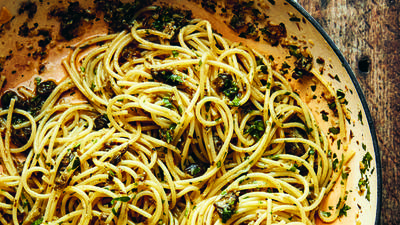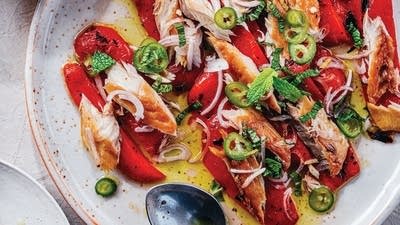
The world is still dealing with the emotional shock it has felt since learning last week of the death of Anthony Bourdain. We at The Splendid Table wanted to offer our own tribute to Tony. We produced a special episode that was released on June 14, 2108 in which we hear from both host Francis Lam and retired host Lynne Rossetto Kasper, who'd interviewed Tony many times over the years. The show also features a special 2004 interview from our archives, one in which Lynne interviews Tony Bourdain alongside his friend and colleague Chef Thomas Keller. The show can be heard using the audio player above. Below is the full transcript.
Francis Lam: Last Friday, America woke up to the awful news that Anthony Bourdain had died. Since then, the world, the food world, but really just the world has been remembering and reflecting on the life of this truly unique person. The tributes have been heartfelt and moving; the astronaut Scott Kelly said that he watched Tony’s show from space, and it made him feel more connected to our planet. The writer Michael Twitty admired Tony for being someone who used his platform to center the stories and voices of people of color and the invisible. The writer Rachel Khong said that Tony’s love of Malaysian food, where her family is from, made her finally feel understood. My wife even got into a cab that night and her driver out of the blue just started talking to her about how much he loved that guy Anthony Bourdain. And on and on and on.
I never knew Anthony Bourdain, and that’s a lifelong regret I’ll have. But reading the encomiums coming from pretty much everyone - black, white, brown, yellow, men, women, non-gender specific - it’s obvious that he meant so many things to so many people.
When Tony introduced himself to the world, it was in the form of his writing. His book, Kitchen Confidential book basically invented the image we have today of the macho bad boy chef. He was a storyteller and entertainer, an ambassador from the Pirate Republic of the kitchen. He was a champion of cooks. And then he grew into a fierce critic of the restaurant culture that he had helped to create, and an advocate for the lesser known and vulnerable people of the world. In a beautiful piece, written on the day he died, the New Yorker’s Helen Rosner wrote that she once asked him if he was a feminist. He kind of danced around the label, until a year or so later, when the #MeToo movement was taking hold, when he approached her an event. And he said, “Remember when you asked me if I was a feminist, and I was afraid to say yes? Write this down: I’m a fucking feminist.”
If you stop to think about it, his story was kind of a roller coaster, full of moral compromises that he honestly acknowledged. But in the end, the grand arc of his grand life was obvious, given his heart and his mind, his sense of what and who mattered.
The remembrances keep coming, from all corners; there are makeshift shrines to him outside his former restaurant, and one person posted a note that just said, “Tony, thank you for inspiring me to kick heroin and to live my life.”
We wanted to take a moment to bring Tony Bourdain to you in his own words, an interview where you can hear his remarkable spirit. It’s from an earlier moment of his career, in 2004 recorded in front of a live audience at the Gourmet Institute in New York City. It was a few years after he’d published Kitchen Confidential, and the house was packed as our host Lynne Rossetto Kasper talked to Tony and his friend, the chef Thomas Keller, from The French Laundry and Per Se.
Lynne Rossetto Kasper: I have two tall, rangy men up here, and they are – I’m going to embarrass you – you guys are gorgeous.
Thomas Keller: Thank you. We love it too.
LRK: We always talk about that dinner party you’d have where you can invite anybody from any time or whatever. Well, you two are on my list. I would love an evening of a lot of good wine and a lot of good food and just letting you guys go. Letting you rip.
TK: What happens after?
LRK: Thomas, it’s a family show. And my husband’s listening. [laughs]
I’m curious to hear how you see each other. You’ve both achieved a tremendous amount of celebrity, and you both work in very specific areas. Thomas, how do you see Tony Bourdain?
TK: I love Tony, I love the way he writes, I love his passion, but most of all I love his honesty about what we do, where we came from, and how far we’ve come in the past two or three decades as an industry and as chefs and cooks. It’s really an accurate history.
LRK: All the rough and tumble in the kitchen.
TK: Exactly. As much as some of us don’t want to admit it, that’s where we came from. How much can you do, you know, how many cigarettes can you smoke, how many beers can you drink? At the same time, you’re putting our 300 dinners for whoever. It’s a physical thing.
LRK: Tony, how about you? How do you see Thomas?
Anthony Bourdain: I’m going to embarrass Thomas, but I think he’s the guy. I think he’s the best chef in America and possibly the world. Certainly, the best meal I’ve ever had with a white table cloth has been at The French Laundry in Napa Valley. I see him as a guy who is practicing the art of cooking at its very highest level, and yet has never lost sight of the importance of soulfulness, of having a sense of humor, of context, of all the other important elements in a great meal. It’s one of the things that distinguishes him from other 3-star Michelin chefs. In my opinion, it makes him better.
TK: Can I hug him?
LRK: You can hug him, go ahead. [Bourdain and Keller hug] I love to know how people come to do what they do because I think most people in the food business did not start out to do what they ending up doing with most of their lives. Tony, you’re a writer and a very gifted one. I think you’ve been writing most of your life, right?
AB: Absolutely wrong. I started very late in life. I would never have been able to become a writer had I not become a fairly useful cook and professional restaurant person. Any good qualities and work ethic that I might have, any stories, any voice, all of that came directly from my first job as a dishwasher and my long slow progress up the ladder in restaurants. I really started writing in 1995 and 1996. I failed spectacularly initially, forgot all about it, and then, on the basis of an obnoxious, over-testosterone memoire, you know my name.
LRK: How did you first get the job as the dishwasher? What got you into the restaurant?
AB: I was a rotten kid. I didn’t have any respect for anyone else; I didn’t have respect for myself. My roommates got sick of me loafing on vacation and they got me a summer job washing dishes. I looked around and I said to myself, that for various reasons, I like this business, I like this lifestyle, I want to be a member of this tribe. It was the first time I went home with something to be proud about, it was the first bunch of people I had met whose respect was important to me. I went home feeling like a champion. I was a very happy dishwasher; the cooks just got more free liquor and better girls.
LRK: Now it comes down to it! I think that makes a great deal of sense because the rewards sometimes are not the ones you were told you should be looking for.
AB: The love affair with food snuck up on me. The pride in my profession, all that came later. I feel in love with the lifestyle first.
LRK: Thomas, you didn’t set out to go to restaurant school. How did you come to food?
TK: How do we all come to food? My mother. She ran restaurants when I was a child. Being the youngest of five boys, she would set me in front of the dishwasher and I thought it was such a fascinating thing; you put something in that was dirty and 30 seconds later it came out clean. This was an amazing thing to a young boy. I grew up in that back-of-the-house role.
Even when I graduated from high school and was going on to college I really didn’t want to be involved in the restaurant business. But there was job security there; my mother would never fire me. Actually, the chef of her restaurant was leaving. She said, “Watch what he does for the next two weeks and you can have his job.” I thought that was very interesting. And that’s kind of what happened.
LRK: Had you ever cooked?
TK: Not really.
LRK: I understand you would call your brother.
TK: I would call my brother who was 18 months older than I am and was actually on a career path to become a chef. If I needed to have any other opinion or direction at all, Joseph would give it to me. Then realizing after two years in that role that it was something that I began to like because you could see results. When you put something in the pan, you knew how it was going to come out. That instant gratification about performing a certain task and seeing the result almost immediately is something that I embraced and enjoyed very much. Another thing about being in the restaurant industry is you can go wherever you want and get a job. A group of us decided one summer to just take off; we all headed to Newport, Rhode Island for the tallships and the Bicentennial, and I ended up working there. I went back the following year and that’s when I met a gentleman who became my mentor. He was the one that made the connection for me – an emotional connection – about to cooking.
LRK: Who is this?
TK: His name is Roland Henin; he was working at the Dunes Club in Narragansett, Rhode Island. He made that connection. It was about giving to someone else something that was so basic but could also be so pleasurable. Bringing that instant gratification satisfaction, doing the function full circle, and watch someone enjoy that.
LRK: Both of you talk about your mothers. Thomas, in your first cookbook The French Laundry, the first paragraphs of the introduction talk about your mother. Something that had me curious, you say your mother taught you to clean house, and that was a very important part of how you became what you are now.
TK: Neurotic? Anal? [laughs]
LRK: How did she play into this besides giving you your first job?
TK: It was the repetition. That’s what being a cook is about. Everyone has this view or idea that it’s a glamorous lifestyle. It’s about repetition and being able to do the same thing day in and day out. It's also about being challenged by that, which is very important, and doing it better today than you did yesterday. As a young child, all the brothers, we had our chores to do. Mine was cleaning the bathroom and how to do that in a way that was the same every week. I had to find some compelling or challenging aspect to that, ways to do it better each time. Those work ethics of repetition are something I got from my mother. Again, it was all coincidence, but it played right into being a cook.
LRK: What about you, Anthony? What part has your mother played in your career?
AB: My mother cooked well, and both parents insisted into shoving both my brother and me into eating well and widely. That certainly resonated later on when I found myself in the business and the moment when I realized I liked it. But I have to echo what Thomas is saying with this sense of order and repetition, it seems sadly lacking in the lives of so many people who come to the restaurant business. We find in the restaurant business the only order that we need and perhaps the only kind of order we would accept. As you probably know, the kind of a personalities who are attracted to the restaurant business are fairly uncontrollable outside of the restaurant, but for whatever reasons – the hierarchy, the repetition, the instant gratification, the control systems in the restaurant – those are all very comforting to many of us.
LRK: Both of you have traveled a long path. You both started cooking in kitchens, and you’ve both reached international celebrity in different ways, but still at the core of it is what happens on a plate. Its’s a philosophical question: How essentially do you keep that core that initially started all of this, the core that keeps you going? I write, and when the writing is really going well and I’ve gotten out of my own way, I almost envision a river running from my stomach – I know it’s an interesting part of the anatomy to choose. [laughs] What I want to know is, with restaurants on both coasts and cookbooks and television shows, how do you stay in touch with that core?
AB: In my case, I’m working with a very narrow classic genre. I run a brasserie with almost no original recipes in the cookbook or at the restaurant. This is probably the type of food I should’ve been cooking my whole life; I’m very comfortable with it. I think food at its best is always an expression of a personality, culture, region, maybe even a time. This is mine. I think it would be an egregious error if I were to try and become an artist I’m not. I’m a journeyman chef and I’m working in a classic model that mirrors my temperament, where I came from, what I love, and who I am.
LRK: I would never call you a journeyman.
AB: I run a turn and burn steak frites brasserie. [laughs] We’re about volume!
LRK: Thomas, I think of you when I think of pristine white plates and food where all the extras have been eliminated. Where is the well? How do you keep that coming?
TK: For me, it’s about the comradery and the collaboration that we have as cooks; not only as cooks but as people in the restaurant. It’s that teamwork and knowing that as you bring everything together –starting at 5:30 in the morning and working through until service begins at 5:30 in the evening – it’s about being part of the group.
LRK: But now your staff is spread all across the country because you have Per Se in New York, The French Laundry in California, and you’re also in Las Vegas. How does that exchange happen now?
TK: I miss them desperately. This is the next challenge: How can we communicate and how can we collectively collaborate on things that we want to work on? That is our challenge. As I was saying earlier, it may take a while but at some point it will become evident to me in the way that we’re going to collaborate together to bring back that collective team effort that was so wonderful when we were all together at The French Laundry. Remember that the staff that is in Vegas or at Per Se was the staff that was all together at The French Laundry for such a long time. We do miss each other desperately and we talk on the phone and email one another. But it’s those spontaneous moments and ideas at one o’clock in the morning while having a glass of wine, throwing an idea out there on the table and the person you’re with adding something else. It’s really about being cooks, it’s not about being a chef or a leader at that moment, it’s about a bunch of people sitting around and talking about food.
AB: I’d just like to say that one of the greatest things about being in this business is that among chefs and cooks there is only two degrees of separation; we all know somebody that knows somebody. There’s the comradery. In what is becoming an increasing transient business, as you travel more and more, people do stages and apprenticeships around the world, you bump into people you know and mutual friends – it’s like being in the mafia, it’s great.
LRK: Tony, do you think people are born to cook?
AB: No. I think you can be born to eat well. You can come from a culture where eating is important, where everyone around you takes food serious, and where the dining and eating experience is central to a culture. Cooks are made. I quote the Jean-Louis Palladin story where some credulous journalist is asking Jean-Louis about when he decided to become a chef assuming he would answer something like, “Since infancy I dreamed of white truffles and sea urchins redolent of the sea and wild mushrooms smelling of the deep forest.” When, in fact, he turned around and sad, “Madame, my parents sold me into slavery.” It happens to you.
LRK: You’ve talked in your books about the real world of who is cooking that elegant French or fusion food in that kitchen is not necessarily somebody who was feasting on white truffles.
AB: The entire restaurant industry in the United States would collapse overnight if it weren’t for the Mexicans and Ecuadorians who came here with no cooking experience whatsoever and started as our dishwashers and porters. It’s one of the things I loathe about the James Beard House. You go to the Beard Awards, you look out and you haven’t seen so many white people since George Wallace ran for president. [audience applauds] I’m glad I got that off my chest; it’s been cooking for a long time.
LRK: I sense that and I’m glad for you. I want to get a picture of how both of you work. So, here's the set up: It's Friday night, you're in the middle of the worst part of the rush, and I walk into your kitchen. Thomas, what would be my first impression?
TK: Hopefully, you're impressed with what you see. We're professionals at what we do, and we've been doing for a long time. You're going to walk into our kitchen wherever it is – whether it’s French Laundry, Bouchon, or Per Se – and be impressed in an inspiring way. What I mean by that is looking at a group of people who are collectively working together for a common goal, not just in the kitchen but in the entire restaurant.
LRK: Is it noisy?
TK: It shouldn't be noisy, no. I mean we try to keep the chaos – you've heard it before, it's controlled chaos. And that's what it's about. Chefs are control freaks. Are they not, Tony? It's the root of who we are. You don't want to have a situation where it's chaos in the kitchen.
LRK: Tony. Les Halles, Friday night.
AB: It’s slightly more civilized at Thomas’s. Okay, Friday night. I'm cursing affectionately. I'm probably on my second margarita. They're playing Mexican hardcore over by the grill station. The bus boys are squeezing behind me. It looks chaotic, but the food is coming up, it's going out on time, it's going to the right customers, it's properly cooked and we're not getting any plates returned from the floor. It is about control, but it's two very different control systems. I tend to foster an “us versus them” mentality in the kitchen that I find very useful in team spirit. It's the Das Boot principle of restaurant management. I think they call it team building.
TK: But the results the same. I think that's the important thing. There's many ways to get to a successful result.
AB: We have slightly lower standards.
LRK: Tony Bourdain. Thomas Keller. Thank you both so much.
Lynne came to The Splendid Table studio shortly after Tony’s death and offered these words in his memory.
LRK: Now here’s the thing about Tony Bourdain. That humor usually came from his take on himself. And then there was his smarts; the breadth of his mind bordered on stunning. And so was the bad boy’s love of danger. And Bourdain the mouthy humanitarian. We saw what was involved when he took on one of media’s sacred cows. The typical travel show, where everything was glossy, no gritty real life glimpses allowed. Where the interesting locals, who are nothing like us, were treated as curiosities. Listen to his evolution over the years. What quickly fell away was his “interviewer” role with its list of preset questions and that careful distance from his subject. Instead Tony talked with other people. He listened. And he asked them to teach him. Tony dug into himself, he challenged himself and he told us about it. Doing a return trip to a Khymer Rouge village where he was waiting to see if the pain of losing a woman he loved would hit him again. His truthfulness freed so many people. I feel lucky to have so much time with him. And Tony, godspeed.
Mental illness comes in lots of forms and even if suicide is not an immediate threat, there are lots of ways to get and to give help. The National Alliance on Mental Illness is the nation’s largest grassroots mental health organization; you can learn more at nami.org. But if you are or know someone who is having thoughts about suicide, know that there is always a trained counselor ready to talk, 24/7, on the National Suicide Prevention Lifeline, 1-800-273-TALK.
And if hearing from other people who deal with depression might help you feel you’re not alone, there’s a podcast called The Hilarious World of Depression; it’s about handling the disease with humor and right now they have an episode that’s all about how to get help. You can find it wherever you get your podcasts.
Before you go...
Each week, The Splendid Table brings you stories that expand your world view, inspire you to try something new, and show how food connects us all. We rely on your generous support. For as little as $5 a month, you can have a lasting impact on The Splendid Table. And, when you donate, you’ll join a community of like-minded individuals who love good food, good conversation, and kitchen companionship. Show your love for The Splendid Table with a gift today.
Thank you for your support.
Donate today for as little as $5.00 a month. Your gift only takes a few minutes and has a lasting impact on The Splendid Table and you'll be welcomed into The Splendid Table Co-op.



